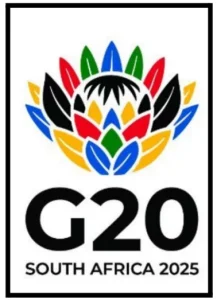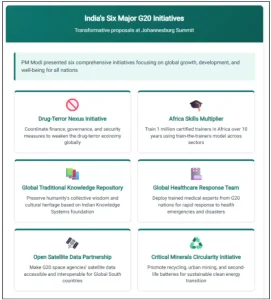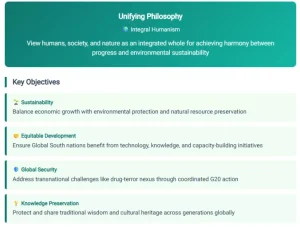Recently, the G20 Summit 2025 was held in Johannesburg, South Africa, marking the first time that a G20 Summit has ever been hosted by an African nation.
Key Highlights of G20 Summit 2025
The Leaders’ Declaration (adopted early, signaling consensus) reflected a strong mandate for inclusive, sustainable, and rules-based multilateralism.
About the 20th G20 Summit 2025
- Location: Johannesburg, South Africa (22 Nov, 2025 – 23 Nov, 2025)
- Theme: Solidarity, Equality, Sustainability (foregrounded the development priorities of the Global South, particularly African nations).
|
- Geopolitical & Institutional Outcomes:
- Africa-Centric Mandate: The summit provided a powerful platform for articulating African developmental aspirations, strengthening South-South Cooperation, and promoting the core philosophy of Ubuntu (“I am because we are”).
 Multilateralism & Stability: Reaffirmation of commitment to a rules-based order, coupled with an unequivocal condemnation of terrorism and concerns over geopolitical fragmentation.
Multilateralism & Stability: Reaffirmation of commitment to a rules-based order, coupled with an unequivocal condemnation of terrorism and concerns over geopolitical fragmentation.- Global Governance Reform: Strong call for the transformative reform of global institutions, particularly the UN Security Council (UNSC), to ensure equitable representation for regions like Africa, Asia-Pacific, and Latin America.
- Climate, Energy, and Finance:
- Climate Ambition: Commitment to accelerate the clean energy transition by pledging to triple global renewable energy capacity and double the annual rate of energy-efficiency improvements.
- Adaptation & Resilience: Pledge to achieve universal early warning systems coverage by 2027, recognizing climate adaptation as a critical priority.
- Debt Sustainability: Prioritization of low-income countries by strengthening global debt sustainability mechanisms and exploring innovative financing tools such as debt-for-development/climate swaps.
COP30: The Belém Climate Mandate (2025)
- The G20 Summit’s climate agenda in Johannesburg was immediately preceded and shaped by the outcomes of the 30th Conference of the Parties (COP30) held in Belém, Brazil (the preceding G20 host country).
- This convergence reinforced the theme of “The COP of Implementation” and set the bar for the G20’s climate finance commitments.
| COP30 Key Outcome |
Relevance to G20 Agenda |
| Triple Adaptation Finance Pledge |
- The G20 was placed under a direct political mandate to create financial mechanisms for the newly promised funding, influencing the G20 Finance Track discussions on development banks and debt.
|
| Tropical Forest Forever Facility (TFFF) |
- Highlighted the urgent G20 need to integrate nature-based solutions and biodiversity conservation (linked to the Critical Minerals discussion) into global economic planning.
|
| Belém Health Action Plan |
- Reinforced the G20’s commitment to building climate-resilient systems and strengthened India’s call for a Global Healthcare Response Team.
|
| Fossil Fuel Transition Roadmap Push |
- Although unsuccessful at COP30, the host nation (Brazil) continued to push G20 leaders for a binding roadmap to phase out fossil fuels, highlighting the divergent priorities within the G20 on energy transition.
|
| Demands for Climate Justice |
- Developing nations, led by the BASIC group (G20 members), pushed for binding timelines on finance delivery (Article 9.1 of the Paris Agreement) and raised concerns over unilateral trade measures like CBAM.
|
|
- Technology and Inclusivity:
- Critical Minerals: Recognition of the strategic importance of Critical Minerals for future technologies, with emphasis on equitable value-sharing and supporting local industrialisation in resource-rich nations.
- Women-Led Development: Explicit commitment to eliminating socio-economic barriers to ensure women’s equal and meaningful participation as agents of change and leaders.
India’s Role at the G20 Johannesburg Summit 2025
The Indian Prime Minister’s participation reinforced India’s role as the “Voice of the Global South” and a bridge-builder, advocating for a human-centric approach to growth and technology.

- Core Policy Philosophy:
- Integral Humanism: Advocated by the PM, it refers to a holistic development model that seeks to balance progress with the planet by integrating the individual, society, economy, and ecology.
- This calls for new development parameters based on equity and sustainability.
- Technology Paradigm: Proposed shifting the focus of critical technologies (AI, Digital) to be “Human-Centric” and “Open-Source” rather than exclusive or finance-centric, ensuring benefits accrue to the widest population.
- Broader Technology and Future Skills Vision: India’s strategy promoted a fundamental shift in the global approach to technology and labour, ensuring it serves human welfare and prepares the world for future challenges.
| Policy Area |
Core Principle / Initiative |
Policy Outcome / Significance |
| Technology Model |
Human-Centric Tech Model |
- Advocacy for welfare-focused, equitable technology frameworks ensuring inclusive digital growth and access.
|
| AI Governance |
Global AI Compact |
- Call for adoption of responsible AI norms based on human oversight, safety-by-design, transparency, and a ban on AI misuse (deepfakes, terror).
|
| Domestic Strategy |
India–AI Mission |
- Focus on equitable access, mass skilling, and responsible AI deployment across society.
|
| Global Convening |
AI Impact Summit 2026 |
- India will host the summit under the theme “Sarvajanam Hitaya, Sarvajanam Sukhaya” to drive global cooperation on inclusive AI.
|
| Labour & Innovation |
Skills Mobility Framework |
- Urged G20 to shift from jobs of today to capabilities of tomorrow, enabling innovation-ready workforce mobility through a global framework.
|

- Climate, Food Security, and Disaster Resilience: India’s proposals emphasised accountability from developed nations and sustainable, resilient solutions rooted in traditional wisdom.
- Climate and Finance Commitments: Reiterated demand for affordable finance and clean technologies from developed countries.
- Urged time-bound delivery of historical climate commitments.
- Disaster Risk Reduction (DRR): Advocated a proactive, development-first approach to DRR.
- Highlighted India’s Coalition for Disaster Resilient Infrastructure (CDRI) as a model.
- Food Security Roadmap: Emphasised millets (Shree Anna) for global nutrition and climate resilience.
- G20 Food Roadmap: Encouraged adoption of the Deccan Principles on Food Security as the basis for a unified G20 roadmap.
- Strengthening the Global South’s Voice: The Indian PM urged expanded Global South representation across global institutions.
- Built on the historic inclusion of the African Union as a permanent G20 member, reinforcing fairness and inclusivity in global decision-making.
Strategic Bilaterals- Deepening India’s Global Outreach
| Counterpart Country |
Key Focus / Outcome |
| Italy |
- Launched the India–Italy Joint Initiative to Counter Terror Financing; enhanced cooperation in counter-terrorism, defence, trade, investment, technology, AI, and space.
|
| Japan |
- Reaffirmed the Special Strategic and Global Partnership; prioritised faster execution of agreements in defence, security, critical minerals, and semiconductors.
|
| Canada |
- Agreed to expand collaboration in defence, space, and other strategic sectors; discussed strengthening trade, investment, and technology ties.
|
| United Kingdom |
- Recognised new momentum in bilateral relations; committed to advancing cooperation across trade, technology, investment, climate, and education.
|
| France |
- Described the partnership as a force for global good; engaged on strategic cooperation, technology, and shared global priorities.
|
| South Korea |
- Explored opportunities to scale up economic, trade, and investment partnerships; acknowledged progress in the Special Strategic Partnership.
|
| Brazil, Angola, Malaysia, Ethiopia, Vietnam, and the United Nations |
- Conducted productive discussions on trade, investment, developmental cooperation, climate collaboration, and strengthening ties with the Global South and international institutions.
|
About G20
- Establishment: The G20 was founded in 1999 following the financial crisis of 1997-98 that impacted the Asian Tigers (East and Southeast Asian countries).
- Initially, it served as a forum for Finance Ministers and Central Bank Governors from major industrialized and developing economies.
- Elevation to Leader’s Level: In the aftermath of the 2008 global financial crisis, the G20 was upgraded to include Heads of State or Government.
- By 2009, it was designated as the “premier forum for international economic cooperation.“
- Membership: The G20 includes 19 countries and the European Union, recently joined by the African Union.
-
- Its members are Argentina, Australia, Brazil, Canada, China, France, Germany, India, Indonesia, Italy, Japan, the Republic of Korea, Mexico, Russia, Saudi Arabia, South Africa, Turkiye, the United Kingdom, and the United States.
- Non-Binding Nature: The G20 operates as a consultative forum, meaning its decisions are not legally binding, and member countries are not obligated to implement them.
- No Permanent Secretariat: The G20 has no standing secretariat; its functioning is driven by an annually rotating Presidency selected from five regional groups created for rotation purposes.
- Five Regional Groups: The 19 member countries are divided into five groups (max four each); most are regional except Group 1 and Group 2, which mix countries from different regions.
- Group 1: Australia, Canada, Saudi Arabia, United States
- Group 2: India, Russia, South Africa, Türkiye
- Group 3: Argentina, Brazil, Mexico
- Group 4: France, Germany, Italy, United Kingdom
- Group 5: China, Indonesia, Japan, Republic of Korea
- EU and AU: Not part of any group
- Presidency Rotation: Each year, a country from a different group becomes President; all countries in that group are equally entitled; Presidency prepares the agenda and coordinates responses to global economic issues.
- Troika System: Ensures continuity through the previous, current, and next Presidencies; during South Africa’s term, the Troika comprises Brazil (past), South Africa (current), USA (next).
- G20 Structure (Tracks):
- Sherpa Track: Focuses on socio-economic issues like climate, health, agriculture, digital economy, and education. Sherpas coordinate negotiations and set the agenda for the summit.
- Finance Track: Led by Finance Ministers and Central Bank Governors, it addresses fiscal and monetary policy, typically meeting alongside World Bank and IMF conferences.
Role and Significance of the G20
- Global Economic Steering & Crisis Management:
- Macroeconomic Coordination: Serves as the premier forum for aligning global economic policies and regulations, ensuring strong, sustainable, and balanced growth.
- Crisis Response Authority: Elevated to a Leaders’ Summit in 2008 during the Global Financial Crisis, enabling coordinated action that prevented a deeper global recession.
- Financial Regulation Reform: Key architect of post-crisis reforms such as Basel III, enhancing global financial resilience, regulatory standards, and supervisory cooperation.
- Economic Powerhouse: The G20 members represent around 85% of the global Gross Domestic Product, over 75% of the global trade, and about two-thirds of the world population.
- Inclusive & Representative Global Governance:
- Bridging Global North–South Divide: Integrates both advanced economies and major emerging markets, providing a vital bridge between developed and developing worlds.
- Enhanced Legitimacy: Inclusion of the African Union as a permanent member strengthens representativeness and mainstreams Africa’s developmental priorities.
- Diverse Representation: Offers a platform for diverse perspectives and solutions, increasing the legitimacy and inclusiveness of global decision-making.
- Broadening Agenda: Though rooted in finance, the G20 now leads discussions on climate change, sustainable development, global health, food security, digital public goods, and anti-corruption.
- Policy Coordination & Global Goal Setting:
- SDG Mobilisation: Acts as a political catalyst for financing and accelerating the 2030 Sustainable Development Goals.
- Climate Action Leadership: Coordinates collective climate response, focusing on climate finance, renewable expansion, technology transfer, and supporting global agreements like the Paris Agreement.
- Debt Sustainability: Works to strengthen global debt management and restructuring frameworks, aiding low-income and vulnerable economies.
- Focus on Global Issues: Through its Finance and Sherpa Tracks, the G20 addresses critical global challenges, fostering international cooperation and long-term economic stability.
- Shaping Global Norms & Standards:
- Informal Norm-Setter: Even without legally binding authority, G20 commitments influence global norms and major institutions like the IMF, World Bank, WTO, and multilateral development banks.
- Multi-Track Engagement: Operates via the Finance Track, Sherpa Track, and several Engagement Groups (B20, C20, T20, W20, Y20), incorporating perspectives from business, civil society, academia, women, and youth.
- Global Governance Hub: Functions as the premier forum for international economic cooperation, shaping the direction of global governance frameworks.
Major G20 Summits & Outcomes
| Year & Summit Location |
Key Outcome / Initiative |
Policy Significance & Impact |
| 2009 (London, UK) |
Framework for Strong, Sustainable, and Balanced Growth |
- Coordinated global fiscal stimulus and banking reforms after the 2008 crisis; stabilized the global financial system.
|
| 2010 (Seoul, South Korea) |
Basel III Norms |
- Introduced stringent capital, liquidity, and leverage requirements, strengthening global banking resilience.
|
| 2010 (Multiple Summits) |
Climate Change Action Plan |
- Encouraged low-carbon strategies among major emitters; laid the groundwork for the 2015 Paris Agreement.
|
| 2017 (Hamburg, Germany) |
Digital Economy Action Plan |
- Advanced global cooperation on digital trade, cybersecurity, data flows, and technological governance.
|
| 2020 (Virtual / Riyadh Presidency) |
Debt Service Suspension Initiative (DSSI) |
- Offered temporary debt relief to low-income nations during COVID-19, helping preserve macroeconomic stability.
|
| 2021 (Rome, Italy) |
Global Minimum Corporate Tax (15%) |
- Endorsed 15% minimum tax to curb profit shifting; major reform in global corporate taxation norms.
|
| 2023 (New Delhi, India) |
Global Biofuels Alliance (GBA) |
- Promoted adoption of sustainable biofuels; boosted global clean energy transition efforts.
|
| 2023 (New Delhi, India) |
India–Middle East–Europe Economic Corridor (IMEC) |
- Major multi-modal connectivity corridor enhancing global trade, energy flow, and strategic integration.
|
| 2024 (Rio de Janeiro, Brazil) |
Global Alliance Against Hunger and Poverty |
- Targets support for 500 million people; commitment to provide 150 million school meals annually by 2030.
|
| 2025 (Johannesburg, South Africa) |
Global Compact for Human-Centric AI |
- Establishes global norms for safe, transparent, and responsible AI; promotes open-source, inclusive, human-centric technological development.
|
Challenges Facing the G20
- Representation & Legitimacy Deficit: The G20’s exclusive membership, lacking a universal mandate, excludes most UN states, reducing the legitimacy, fairness, and global acceptance of its decisions.
- Transparency, Inclusiveness & Accountability Gaps: With no permanent secretariat, weak consultation, and opaque processes, the G20 shows low institutional memory, inclusiveness, and accountability despite shaping major global policies.
- Limited Policy Effectiveness: Restricted membership and developed-country dominance narrow perspectives, limiting the G20’s capacity to address universal issues like climate change, pandemics, AI governance, and debt crises.
- Divergent Priorities: Conflicting goals of advanced and developing economies on finance, technology, climate, and trade hinder consensus, slowing progress on equity, climate justice, and fair global governance.
- Geopolitical Rivalries: US–China tensions, Russia–West confrontation, and regional conflicts fragment cooperation, while boycotts and leader absences weaken collective action and dilute outcomes.
- Weak Multilateralism & Implementation Gap: Falling Official Development Assistance (ODA), delayed climate finance, and non-binding commitments create large implementation gaps, leaving pledges on debt relief, food security, and digital taxation unfulfilled.
US Boycott of the 2025 Johannesburg G20 Summit
- The US boycott of the 2025 G20 Summit in South Africa—rooted in political and ideological tensions—became a pivotal moment that enabled a Global South–driven consensus and signalled the G20’s ability to function without unanimity from major Western powers.
Why did the US boycott the Summit?
- Ideological Clash: The US President accused South Africa’s Black-majority government of persecuting white Afrikaners, claims rejected by South Africa.
- Policy Friction: The US opposed the South African presidency’s priorities, including:
- Stronger climate commitments (renewables, adaptation finance)
- Debt relief and inequality reduction
- Shift toward Global South narratives
- The US warned that no Leaders’ Declaration should be adopted in its absence.
Outcomes Enabled by the US Absence
- Early Adoption of Leaders’ Declaration: In an unprecedented move, the Declaration was approved at the start of the summit, blocking future US veto and strengthening climate and development language.
- Stronger Global South Focus: The Declaration emphasised:
- Climate justice, renewable expansion, early-warning systems
- Debt reform, multilateralism, and development finance
- Despite US objections, members achieved a robust consensus text.
- Diplomatic Fallout:
- Protocol Dispute: South Africa refused the US offer to send only a chargé d’affaires, calling it a protocol insult. The US accused Pretoria of “weaponising” the G20 presidency.
- Symbolic Tension: President Ramaphosa’s remark on handing the gavel to an “empty chair” highlighted the diplomatic rift.
Impact on the G20
- Institutional Resilience: The summit demonstrated the G20’s capacity to act even without a major power, avoiding paralysis.
- Global South Assertion: African and developing-country leadership gained momentum, reinforcing calls for:
- Climate finance reform
- Debt justice
- Inclusive multilateralism
- Shift in Power Dynamics: The episode signalled a declining Western veto in multilateral groupings and a growing multipolar influence in global governance.
|
Way Forward for a More Effective G20
- Regional Consultative Groups (RCGs) for Inclusion: Financial Stability Board–style RCGs across regions enable structured regional dialogue, widen representation, strengthen legitimacy, and integrate non-member priorities into G20 decision-making.
- Formalised Global South Participation: Permanent observers, rotating guest seats, and engagement with ASEAN (Association of Southeast Asian Nations), CARICOM (Caribbean Community), PIF (Pacific Islands Forum), and ECOWAS (Economic Community of West African States) broaden voice and correct representation gaps.
- Stronger Institutional Architecture: A permanent G20 secretariat, strengthened Troika mechanism, and new working groups on climate finance, artificial intelligence, debt relief, and hunger enhance continuity, track commitments, and enable coordinated action.
- Equitable Development & Climate Justice: Binding climate-finance timelines, a G20 Green Development Fund, reformed global debt architecture, and expanded IMF (International Monetary Fund) Special Drawing Rights (SDRs) ensure fair resource flows for developing nations.
- Prioritising Hunger & Food Security: Scaling anti-hunger alliances, promoting climate-resilient crops like millets, strengthening nutrition systems, and adopting Deccan Principles enhance global food resilience.
- Human-Centric Technology & AI Governance: Global norms for safe, transparent, accountable AI, regulation of deepfakes and cyber misuse, and promotion of open-source digital public goods ensure equitable, human-aligned technological growth.
Conclusion
The 2025 Summit reinforced the G20’s role in promoting equity, sustainability, and multilateral reform. Its credibility now hinges on implementing commitments, strengthening Global South representation, and advancing a human-centric global governance model.
![]() 24 Nov 2025
24 Nov 2025

 Multilateralism & Stability: Reaffirmation of commitment to a rules-based order, coupled with an unequivocal condemnation of terrorism and concerns over geopolitical fragmentation.
Multilateralism & Stability: Reaffirmation of commitment to a rules-based order, coupled with an unequivocal condemnation of terrorism and concerns over geopolitical fragmentation.

